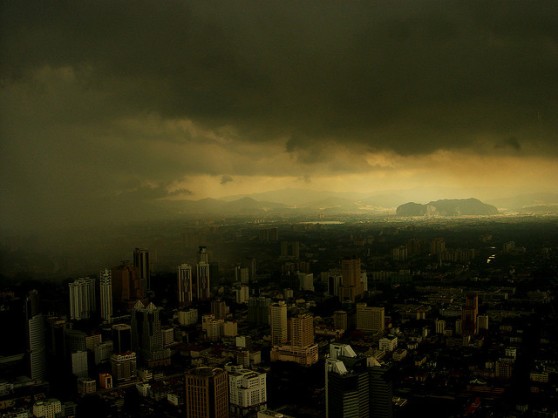
Photo (CC) Public Domain Review @ Flickr
*
Uprisings
1
Dawn comes in and in
while we lie shuddering
in our uselessness.
…………(Something falls
…………in the heart. It is time
…………to stop, to act.)
Light splinters
on the backs of clouds,
tumbles
down to us like rain
and becomes politics.
…………Faces are cut into smiles.
…………Flesh is butchered from bones.
And so, lovers of the revolution
spread fierce happiness
in peaceful places, until not even love
survives.
.
2
We watch the gutters fill with smoke,
mixing ash with soil, leaves spreading their panic
along like Spanish fire-ships through an immense
new ocean.
………..The floor, she said, is lava. We tried leaping
………..but lost our legs on the old carpet.
Later, around a camp-fire, singing
songs that vanish from our mouths.
………..There is no peace, she said. If there were peace
………..there would have to be war. And there cannot be war.
The floor is lava, look. The roads are burning in the cities.
………..Can we forget ourselves, with enough
………..discourtesy
………..to become human?
She just laughed and said, keep jumping.
The fire is nothing here, our flesh
steaming around us……………bodies
……….catching light, riding into the air
……….as bonfire-sparks.
Between fire and the cold night of the stars.
When we fell, it was as water and ash, separate as steam
from smoke.
.
3
………..It took time and air, the
………..gentle nuzzling of new
………..leaves.
We stood amongst our belongings
looking around, breathing.
Nobody wanted to move.
We stared at the water, hands white with ash,
hardly daring to believe that we survived
the conflagration.
………..A wind blew up, swirling in from the west, so hard and green
………..that all that was not brick began to move, calm at first, whitened by fire,
………..rose with a half turn toward the water, skirts of dust
………..in hand, then
………..stepped
………..across the surface, crisp blue, and once there
………..vanished.
We remembered the shape we had held. We remembered
the fire and how it leapt between us. Being steam
was no great trouble. It was the light that came after
shattering our delicate forms. We crumbled
to calcium carbonate, calcium oxide.
……………………………….At night we shiver. Daylight bakes
……………………………….our cities away.
……………………………….She said, after this there will be no more need
……………………………….of fire. I smiled and held her
……………………………….while her body
……………………………….blew away.
*
1912
He sleeps through the night,
and holds
a dream of
ox-carts, and a cold
hard grave.
But the morning
wakes up sick,
and when the sun should
rise, a blizzard runs
red sunlight
on Antarctic snow.
………….-I am just going outside-
………………………………………………..It’s
golden, golden, golden
where the corpse should be.
………….-Snow through air
………….like shaken wheat-
‘I am just going outside
and may be some time.‘
.
~ ~ ~
.
…………..Sleep; until a rumble
…………..of sudden ice.
We float past many horrible goodbyes,
the quiet look of hope in the brave men’s eyes
as the wives are put into lifeboats.
……………………………………………………..-He stretches
……………………………………………………..a kiss, in his
……………………………………………………..pressed black suit;
……………………………………………………..his waistcoat
……………………………………………………..dangles
……………………………………………………..over black sea,
……………………………………………………..shining-
And
……later, in the tented dark,
we watch the reddened sweep of wind,
………….-the snow falls through
………….the air like husbands
………….through black water-
and
……then dawn, or searchlights
on the scattered waves.
…………Everything looks just
…………golden
…………where the
…………ship went
…………down.
For now we will huddle in the lee of waves
and wait for the sun, blood
red over peach-plum waters, quiet as
a candle through a depth of snow.
.
~ ~ ~
.
…………On both sides of the main gate
…………the doors stand wide, light
…………coursing into a courtyard
…………tiled with snow.
…………Before he gets
…………to the street he hears firing,
…………returns
………………….immediately and sees all the
family lying on the floor. The blood
running in streams.
………….(streaming)
Time passes, and a little tenderness
smothers each cruelty.
Freezing men in ox-carts
move over frozen fields to
where a pre-dug grave waits
between thin trees.
………….The stars poke
their noses through for a moment, and
afterwards there is a blizzard as the
clouds roll the night away like waves.
………….The maid
who had wheat in her pockets begins
to sprout,
………….the soil will rise up
……………………..golden
……………………..come the spring
.
*
ABOUT THE POET
Christopher Oakey is a PhD candidate at the University of New South Wales, studying Modernist and Post-Modernist poetics in relation to the philosophies of Martin Heidegger and Ludwig Wittgenstein. Christopher recently completed a Masters degree research project on the poetic epistemologies of Hilda Doolittle and William Carlos Williams. Chris has also published poetry in multiple venues, including The Cordite Poetry Review, Tabula Rasa and Contrappasso 1 and 2.









